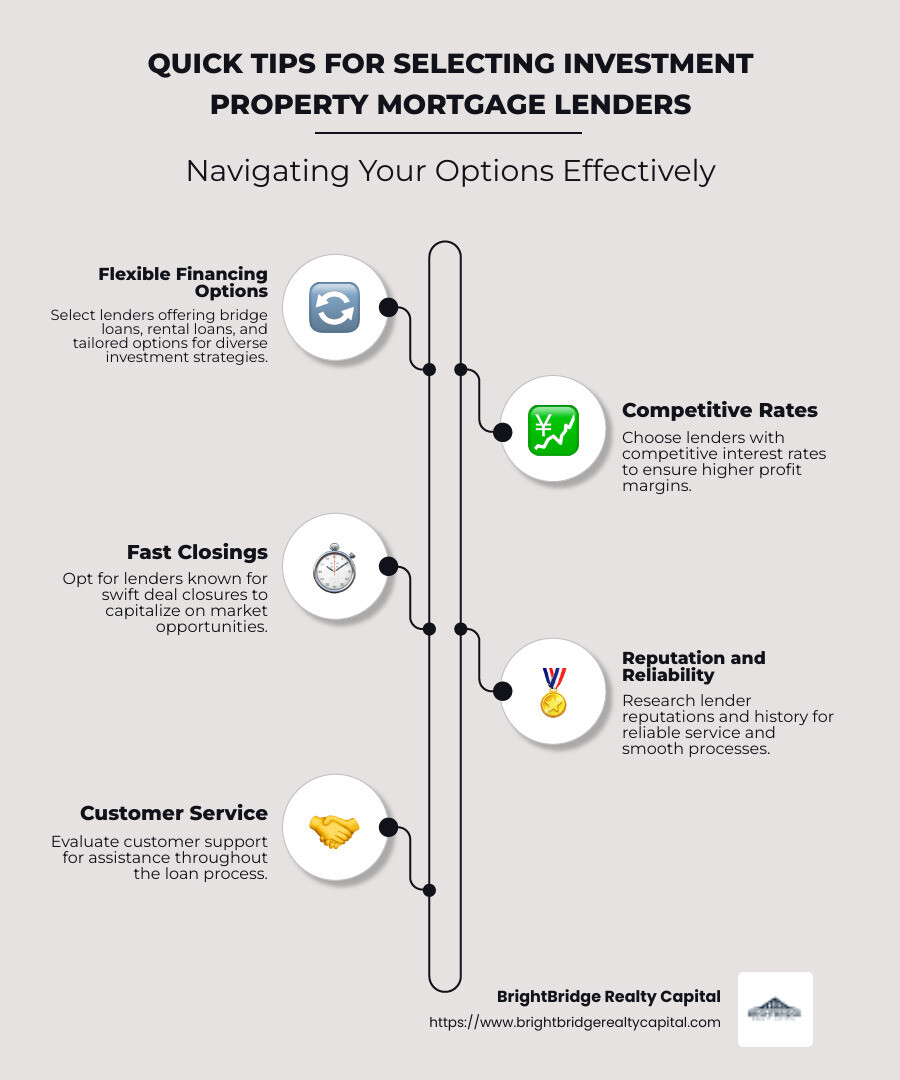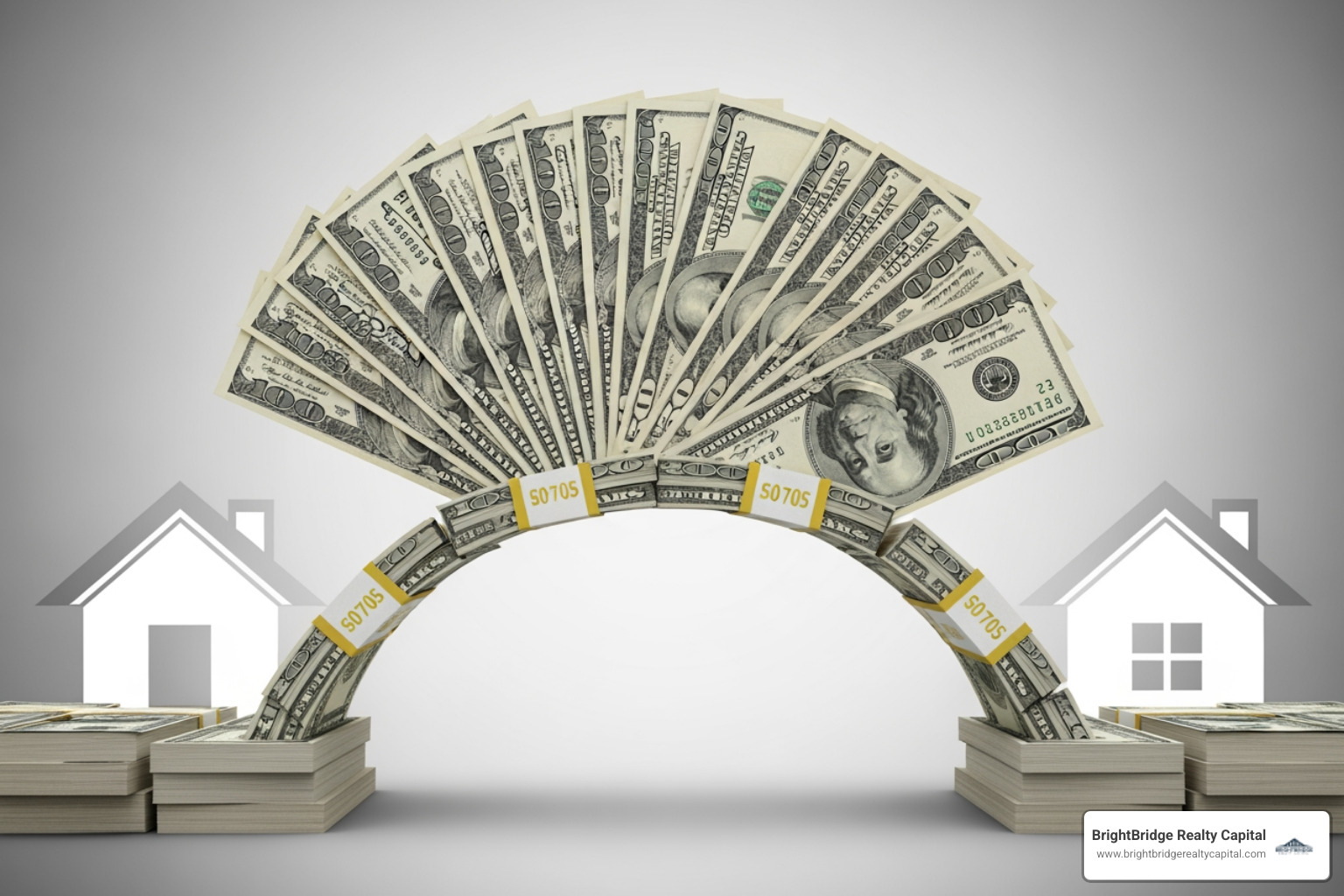Invest Smart: Comparing the Top Mortgage Lenders for Your Property

When it comes to investment property mortgage lenders, the landscape is vast and varied. Real estate investors are always on the lookout for mortgage lenders who offer quick, flexible financing solutions that can turn property dreams into reality. Whether you're aiming to expand your rental portfolio or start on a fix-and-flip project, understanding your mortgage options is crucial.
Here are some quick tips if you’re in a hurry:
- Flexible Financing Options: Look for lenders offering custom loans to suit different investment strategies—bridge loans, rental loans, and more.
- Competitive Rates: Prioritize lenders with competitive interest rates to maximize your profit margin.
- Fast Closings: Seek out lenders known for their ability to close deals swiftly, allowing you to seize market opportunities before they slip away.
Navigating the complexities of financing can be challenging, but with the right knowledge and an ideal lender, you're well on your way to building an impressive property portfolio.

Understanding Investment Property Mortgages
When diving into investment property mortgages, there are a few key factors to consider: mortgage rates, rental income, and down payment. Let's break these down.
Mortgage Rates
Investment property mortgage rates are typically higher than those for a primary residence. Why? Lenders see investment properties as riskier. There's a higher chance of default because these properties are not your primary home, and in tough times, people prioritize their primary residence over investments.

Rental Income
Rental income is a significant factor when considering an investment property. It can help offset monthly mortgage payments, making your investment more manageable. Lenders often look at potential rental income to determine how much they are willing to lend you. A property in a high-demand rental area can be more appealing to lenders.
Pro Tip: Before buying, research the rental market in your target area. Websites like Zillow or Realtor.com can help you gauge rental prices and demand.
Down Payment
The down payment for an investment property is usually higher than for a primary residence. Expect to put down at least 20%. This larger down payment reduces the lender's risk and can sometimes lead to better mortgage rates.
A higher down payment also shows lenders you're serious about the investment. It’s like saying, "I'm committed to this property and ready to make it work."
Understanding these core elements of investment property mortgages can help you make informed decisions. Up next, we'll explore the top investment property mortgage lenders and what they offer.
Top Investment Property Mortgage Lenders
When it comes to securing financing for your investment property, choosing the right lender is crucial. Let's explore some key aspects of what top investment property mortgage lenders offer.
Loan Options
Top lenders provide a variety of loan options to suit different investment strategies. Common choices include:
- Fixed-rate mortgages: These offer stability with consistent monthly payments.
- Adjustable-rate mortgages (ARMs): These start with lower rates that adjust over time, which can be beneficial if you plan to sell or refinance in the near future.
- Jumbo loans: Ideal for high-value properties, offering financing above conventional loan limits.
These options allow you to tailor your financing to match your investment goals and risk tolerance.
Flexible Financing
Flexibility is key when dealing with investment properties. Leading lenders understand this and offer various features to accommodate your needs:
Prepayment penalty options: Some lenders provide prepayment penalty choices, allowing investors to customize their loans based on their financial strategy.
Loan-to-value (LTV) ratios: Lenders usually require a maximum LTV ratio, ensuring you have sufficient equity in the property. This reduces their risk and can lead to more favorable terms for you.
Portfolio loans: These consolidate multiple properties into a single loan, simplifying management and potentially lowering costs.
Credit Requirements
Your credit score plays a significant role in securing an investment property loan. Top lenders typically have stricter credit requirements compared to primary residence loans:
Higher credit scores: Expect to need a score of at least 660, though some lenders might require higher for the best rates.
Cash reserves: Lenders often require 6-12 months of cash reserves to ensure you can cover mortgage payments during vacancies or unexpected expenses.
Documentation: Be prepared to provide detailed financial documentation, including tax returns and proof of rental income, to demonstrate your ability to manage the investment.
By understanding these aspects, you can better steer the landscape of investment property mortgage lenders and choose the one that aligns with your investment strategy.
Next, we'll dig into the key aspects of investment property loans, covering loan types, eligibility, and underwriting criteria.
Key Aspects of Investment Property Loans
When diving into investment property loans, understanding the loan types, eligibility, and underwriting criteria is essential for making informed decisions.
Loan Types
Investment property loans come in various forms, each catering to different investment strategies:
Conventional Loans: These are the most common and typically require a higher down payment and credit score. They follow Fannie Mae and Freddie Mac guidelines.
Hard Money Loans: Ideal for short-term investments, these loans offer quick financing but come with higher interest rates.
Portfolio Loans: These allow you to consolidate multiple properties into one loan, simplifying management and potentially reducing costs.
Each loan type has its pros and cons, so it's crucial to align your choice with your investment goals.
Eligibility
Eligibility for an investment property loan can be more stringent than for a primary residence:
Down Payment: Most lenders require at least a 20% down payment, though it can go up to 35% if your credit is less than stellar. A larger down payment often results in better loan terms.
Credit Score: A good credit score is vital. Lenders typically expect a minimum score of 660, but higher scores can secure better interest rates and terms.
Cash Reserves: Expect to have 6-12 months of cash reserves to cover mortgage payments and unexpected expenses, ensuring you can manage during vacancies or downturns.
Meeting these eligibility criteria is key to securing favorable loan terms.
Underwriting
Underwriting for investment property loans involves a thorough evaluation of both the borrower and the property:
Income Verification: Lenders will assess your personal income and any rental income to ensure you can handle the mortgage payments. Be prepared with tax returns and pay stubs.
Property Assessment: The property must meet certain standards, and lenders will check for any significant repair needs that could affect its value or rental potential.
Debt-to-Income Ratio (DTI): Your DTI ratio should ideally be under 50%. This shows lenders that you can manage your debt responsibly.
By understanding these key aspects, you'll be better equipped to steer the complexities of investment property loans and choose the right option for your investment strategy.
Next, we'll address some frequently asked questions about investment property mortgage lenders, including typical requirements and how rates compare to those for primary residences.
Frequently Asked Questions about Investment Property Mortgage Lenders
What are the typical requirements for an investment property loan?
When you're looking to secure an investment property loan, there are a few key requirements you need to keep in mind:
Down Payment: Investment properties typically require a larger down payment than primary residences. Expect to put down at least 20%, but this can go up to 25% or more, depending on your credit score and the lender's policies.
Credit Score: A strong credit score is crucial. Most lenders look for a minimum score of 620, but a higher score can open the door to better interest rates and terms.
Cash Reserves: Lenders want to see that you have enough cash reserves to cover 6-12 months of mortgage payments. This acts as a safety net in case of vacancies or unexpected expenses.
Meeting these requirements helps reassure lenders that you're a reliable borrower.
How do investment property mortgage rates compare to primary residence rates?
Interest rates for investment property mortgages are generally higher than those for primary residences. Here's why:
Higher Risk: Lenders view investment properties as riskier because they're not your primary home. This increased risk means higher interest rates, often 0.5% to 1% more than primary residence rates.
Rate Differences: If a conventional mortgage for a primary residence is at 6.5%, expect an investment property loan to be around 7.5% or more, depending on your creditworthiness and the down payment.
This difference in rates reflects the lender's need to safeguard against potential defaults.
What types of properties qualify for investment property loans?
Investment property loans can finance a variety of properties, each with its unique features:
Single-Family Homes: These are popular for beginner investors due to their simplicity and ease of management.
Multi-Unit Homes: Properties with 2-4 units can generate multiple income streams, making them attractive to seasoned investors.
Rental Properties: Any property intended for generating rental income can qualify, including vacation homes and condos.
Understanding these property types helps you identify the right investment opportunity for your strategy.
By grasping these FAQs, you're better prepared to steer investment property mortgage lenders and make informed decisions that align with your financial goals.
Next, we'll explore how BrightBridge Realty Capital can assist you in achieving fast closings and direct lending for your investment property needs.
Conclusion
At BrightBridge Realty Capital, we understand that when it comes to investment properties, time is of the essence. That's why we pride ourselves on offering fast closings and direct lending solutions that cater specifically to real estate investors.
With our streamlined process, we can often close deals within a week. This speed allows you to seize opportunities as they arise, ensuring you don't miss out on profitable investments. Our direct lending approach eliminates intermediaries, which means you benefit from competitive rates and a seamless experience from start to finish.
We offer customized financing solutions that are custom to meet your unique needs. Whether you're looking to expand your rental portfolio, finance a fix-and-flip project, or invest in a multi-unit property, our team is here to support you every step of the way.
If you're ready to take the next step in your investment journey, explore our services and see how we can help you achieve your real estate goals with speed and confidence.


